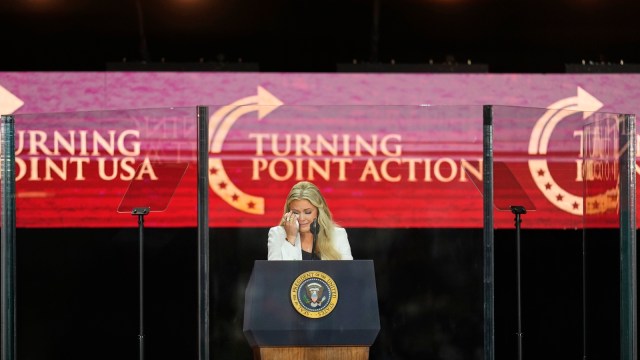
Erika Kirk’s speech at her husband and political activist Charlie Kirk’s memorial was one of those rare moments when private grief and public witness converged in a way that felt larger than the occasion itself. The memorial carried unmistakable religious overtones, but Erika’s words stood out for their clarity, vulnerability, and courage. While others leaned into the rhetoric of combat and retribution, she chose a different register: Forgiveness. In a nation deeply fatigued by polarisation and inequalities, her decision to place mercy at the centre may be the most radical and necessary gesture America could hear right now.
The most striking element of her speech was her public act of forgiving 22-year-old Tyler Robinson, the man accused of killing her husband. “I forgive him,” she said, invoking Christ’s words from the cross: “Father, forgive them, for they know not what they do.” It was not a throwaway line or an attempt at easy piety; it was the core of her message. To offer forgiveness at such a moment is almost unthinkable in human terms. Yet, in that unthinkable act lay its power. She chose to break the chain of vengeance that often defines both personal tragedies and narratives. In doing so, she lived out what the Christian tradition regards as one of its hardest but most transformative commands: To love one’s enemies and to resist answering hate with hate.
For Christians, her words were a Christ-like act of discipleship since forgiveness in the face of violence lies at the heart of the Gospel. But her choice was also profoundly American. The nation has long wrestled with justice, mercy, accountability, and second chances. Former President Abraham Lincoln’s call for “malice toward none” and minister and activist Martin Luther King’s reminder that “hate cannot drive out hate” show mercy as a civic and a private virtue. In her own way, Erika Kirk stood in that lineage.
What made her speech particularly compelling was that it was in such contrast to the voices around her. At the same memorial, political leaders, including President Donald Trump, framed Kirk’s assassination in terms of battle lines and cultural warfare. The temptation to weaponise tragedy is strong, and it so often prevails. Erika resisted that path. Her refusal to amplify division was itself an implicit rebuke to a culture where each fresh wound is used to deepen old resentments. In this sense, her speech was not only an expression of faith but also a civic intervention, cutting through the noise with a call to a higher standard.
Of course, her message was not limited to forgiveness alone. She spoke movingly about Charlie’s devotion to faith and family, urging men to be protectors and leaders within their homes and women to nurture spaces of love and stability. These appeals reflected traditional Christian commitments and may have sounded dated for some. Yet even critics would have to acknowledge the sincerity with which she tied her husband’s legacy to a vision of stronger and more compassionate communities. In an age when political discourse often drifts into abstraction, her insistence on grounding renewal in family and faith gave her words an immediate and human texture. What also stood out was her vulnerability. She did not hide behind platitudes or polished soundbites. She spoke of her heartbreak, of the intimate details of her marriage, even of regrets and moments left unfinished. That rawness made her message believable. It reminded listeners that such violence is not just political but also inflicts a human wound, borne in flesh and blood. In choosing honesty over performance, Erika extended an invitation to empathy at a time when empathy is in short supply.
Was her speech what America needed now? In many ways, yes. Because it modelled courage where outrage is easy and mercy rare, showing faith as a resource for healing rather than division. In addition, it pointed to public life shaped not by vendetta but by reconciliation. It revealed that forgiveness doesn’t erase justice but refuses to let vengeance set the terms. Her words also highlighted the risk that louder, angrier voices could drown out such a countercultural message. In a nation driven by division and blame, her speech was a reminder that another way is possible.
In more ways than one, Erika Kirk’s eulogy, therefore, was not merely a tribute to her late husband. Above all, it offered a compelling vision for a nation searching for its moral compass. By forgiving in grief, speaking love amid anger, and anchoring hope in faith and family, she sketched an alternative both Christian and American. Whether America will embrace it is uncertain, but in an age of bitterness and vengeance, her words remain a fragile yet luminous reminder that mercy and compassion may be the only way forward.
The writer is former professor and dean, Christ University, Bengaluru